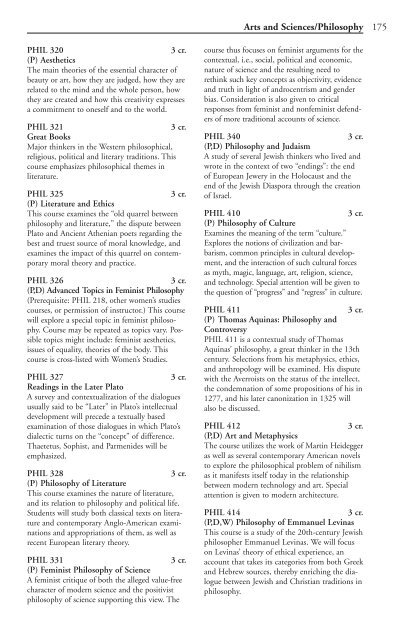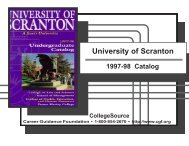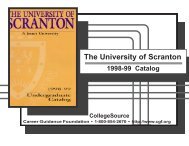2003-2004 - The University of Scranton
2003-2004 - The University of Scranton
2003-2004 - The University of Scranton
You also want an ePaper? Increase the reach of your titles
YUMPU automatically turns print PDFs into web optimized ePapers that Google loves.
PHIL 320 3 cr.<br />
(P) Aesthetics<br />
<strong>The</strong> main theories <strong>of</strong> the essential character <strong>of</strong><br />
beauty or art, how they are judged, how they are<br />
related to the mind and the whole person, how<br />
they are created and how this creativity expresses<br />
a commitment to oneself and to the world.<br />
PHIL 321 3 cr.<br />
Great Books<br />
Major thinkers in the Western philosophical,<br />
religious, political and literary traditions. This<br />
course emphasizes philosophical themes in<br />
literature.<br />
PHIL 325 3 cr.<br />
(P) Literature and Ethics<br />
This course examines the “old quarrel between<br />
philosophy and literature,” the dispute between<br />
Plato and Ancient Athenian poets regarding the<br />
best and truest source <strong>of</strong> moral knowledge, and<br />
examines the impact <strong>of</strong> this quarrel on contemporary<br />
moral theory and practice.<br />
PHIL 326 3 cr.<br />
(P,D) Advanced Topics in Feminist Philosophy<br />
(Prerequisite: PHIL 218, other women’s studies<br />
courses, or permission <strong>of</strong> instructor.) This course<br />
will explore a special topic in feminist philosophy.<br />
Course may be repeated as topics vary. Possible<br />
topics might include: feminist aesthetics,<br />
issues <strong>of</strong> equality, theories <strong>of</strong> the body. This<br />
course is cross-listed with Women’s Studies.<br />
PHIL 327 3 cr.<br />
Readings in the Later Plato<br />
A survey and contextualization <strong>of</strong> the dialogues<br />
usually said to be “Later” in Plato’s intellectual<br />
development will precede a textually based<br />
examination <strong>of</strong> those dialogues in which Plato’s<br />
dialectic turns on the “concept” <strong>of</strong> difference.<br />
Thaetetus, Sophist, and Parmenides will be<br />
emphasized.<br />
PHIL 328 3 cr.<br />
(P) Philosophy <strong>of</strong> Literature<br />
This course examines the nature <strong>of</strong> literature,<br />
and its relation to philosophy and political life.<br />
Students will study both classical texts on literature<br />
and contemporary Anglo-American examinations<br />
and appropriations <strong>of</strong> them, as well as<br />
recent European literary theory.<br />
PHIL 331 3 cr.<br />
(P) Feminist Philosophy <strong>of</strong> Science<br />
A feminist critique <strong>of</strong> both the alleged value-free<br />
character <strong>of</strong> modern science and the positivist<br />
philosophy <strong>of</strong> science supporting this view. <strong>The</strong><br />
Arts and Sciences/Philosophy 175<br />
course thus focuses on feminist arguments for the<br />
contextual, i.e., social, political and economic,<br />
nature <strong>of</strong> science and the resulting need to<br />
rethink such key concepts as objectivity, evidence<br />
and truth in light <strong>of</strong> androcentrism and gender<br />
bias. Consideration is also given to critical<br />
responses from feminist and nonfeminist defenders<br />
<strong>of</strong> more traditional accounts <strong>of</strong> science.<br />
PHIL 340 3 cr.<br />
(P,D) Philosophy and Judaism<br />
A study <strong>of</strong> several Jewish thinkers who lived and<br />
wrote in the context <strong>of</strong> two “endings”: the end<br />
<strong>of</strong> European Jewery in the Holocaust and the<br />
end <strong>of</strong> the Jewish Diaspora through the creation<br />
<strong>of</strong> Israel.<br />
PHIL 410 3 cr.<br />
(P) Philosophy <strong>of</strong> Culture<br />
Examines the meaning <strong>of</strong> the term “culture.”<br />
Explores the notions <strong>of</strong> civilization and barbarism,<br />
common principles in cultural development,<br />
and the interaction <strong>of</strong> such cultural forces<br />
as myth, magic, language, art, religion, science,<br />
and technology. Special attention will be given to<br />
the question <strong>of</strong> “progress” and “regress” in culture.<br />
PHIL 411 3 cr.<br />
(P) Thomas Aquinas: Philosophy and<br />
Controversy<br />
PHIL 411 is a contextual study <strong>of</strong> Thomas<br />
Aquinas’ philosophy, a great thinker in the 13th<br />
century. Selections from his metaphysics, ethics,<br />
and anthropology will be examined. His dispute<br />
with the Averroists on the status <strong>of</strong> the intellect,<br />
the condemnation <strong>of</strong> some propositions <strong>of</strong> his in<br />
1277, and his later canonization in 1325 will<br />
also be discussed.<br />
PHIL 412 3 cr.<br />
(P,D) Art and Metaphysics<br />
<strong>The</strong> course utilizes the work <strong>of</strong> Martin Heidegger<br />
as well as several contemporary American novels<br />
to explore the philosophical problem <strong>of</strong> nihilism<br />
as it manifests itself today in the relationship<br />
between modern technology and art. Special<br />
attention is given to modern architecture.<br />
PHIL 414 3 cr.<br />
(P,D,W) Philosophy <strong>of</strong> Emmanuel Levinas<br />
This course is a study <strong>of</strong> the 20th-century Jewish<br />
philosopher Emmanuel Levinas. We will focus<br />
on Levinas’ theory <strong>of</strong> ethical experience, an<br />
account that takes its categories from both Greek<br />
and Hebrew sources, thereby enriching the dialogue<br />
between Jewish and Christian traditions in<br />
philosophy.
















